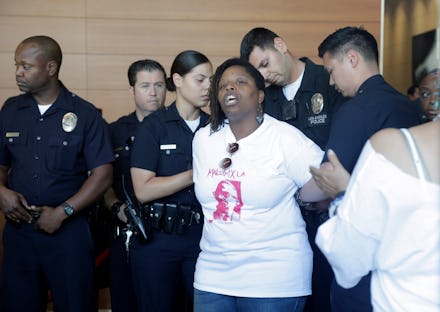Black Lives Matter's Patrisse Cullors lists demands for LA after Carnell Snell, Jr. death

The police killing of Carnell Snell Jr. in South Los Angeles on Saturday broke the hearts of his family, friends and neighbors. But according to Black Lives Matter co-founder Patrisse Cullors, the 18-year-old's death has broader implications too — and most of them are tied to failures of leadership at City Hall and police headquarters.
That's why Cullors and several other activists from the L.A. chapter of Black Lives Matter have vowed to put more pressure on Mayor Eric Garcetti and the Los Angeles Police Department. The goal? To end police violence against black Angelenos.
"At this point, we don't see any other option, other than disrupting business as usual," Cullors said Monday night.
Cullors and Black Lives Matter L.A. have demanded that Mayor Garcetti fire LAPD Chief Charlie Beck and start addressing the black community's grievances around policing more seriously. Organizers are also calling on black elected officials to be more responsive.
"There's a generation of black people in L.A. who are seeing our friends, family and community members being gunned down by LAPD," Cullors said. "In a large part, black elected officials have been silent on this issue."
Cullors said she and about 20 other protestors tried to raise these concerns with Chief Beck personally during a press conference at police headquarters on Monday. They were not allowed in. As the group chanted in protest outside, Cullors was arrested with local activists Melina Abdullah and Niki Okuk.
The trio was later released from jail Monday evening on their own recognizance, after being charged for allegedly disobeying a police order to disperse, Cullors said. The three are expected to appear in court Oct. 24, regarding the misdemeanor charge.
The LAPD did not immediately respond to Mic's request for additional information about the activists' arrests, or about Snell's case.
Carnell Snell Jr. was killed near the intersection of 107th Street and Western Avenue in Los Angeles Saturday afternoon. According to the Los Angeles Times, Beck said officers confronted Snell because he'd glanced at police who were tailing the vehicle he was in, which allegedly had plates that didn't match the year of the car.
Beck said Snell, who was in the back seat, ducked down "as if to hide" from officers. When police turned on their lights and sirens, Snell reportedly exited the vehicle clutching his waistband, as though he were supporting something. Believing the teen had a gun, officers chased him to the driveway of a nearby house and fatally shot him.
But Snell's family and local activists said the teen was running away from officers and was shot in the back, according to their social media posts on Saturday. On Tuesday, Beck released surveillance video from a nearby business that shows Snell holding a gun before his encounter with officers, who were not wearing body cameras.
Police recovered a firearm about five feet from Snell's body, Beck said.
The Snell shooting became yet another example of police or vigilante violence against black men, a pattern that has sparked a nationwide conversation about race, policing and criminal justice. According to the Associated Press, which cited a Los Angeles Police Department "use of force" report released Tuesday, black people were 77 of the 223 people shot at by the department's officers between 2011 and 2015 — a disproportionate rate, considering black people make up just 9.6% of L.A.'s population.
Today, the Black Lives Matter network stands as one of this conversation's main legacies. BLM started as a hashtag movement on social media after the 2013 acquittal of George Zimmerman in the shooting death of unarmed black teen Trayvon Martin in Florida. It has since grown into a network of more than 40 chapters globally.
In August, the Movement for Black Lives — a coalition of more than 50 organizations under the BLM umbrella — released "A Vision for Black Lives," an in-depth policy platform that calls for an end to state-sanctioned violence against black Americans, black immigrants and black LGBTQ people.
Movement for Black Lives organizers have recently called on supporters to escalate resistance around the country, according to a statement released Monday. Demonstrations nationwide have grown particularly heated in recent weeks — most notably after the police shooting death of Keith Lamont Scott on Sept. 20 in Charlotte, North Carolina.
Protesters responded to Scott's death with peaceful protests, parts of which were disrupted by civil unrest. Activists dubbed it the "Charlotte Uprising."
"If you're in North Carolina, come to Charlotte," organizer Ashley Williams said in the Monday statement. "If you're elsewhere, organize a rally, march, or turn up to pull out your communities in solidarity with Charlotte, with Tulsa, with San Diego, with every city where black folks are rising up to demand strange fruit no more!"
During his press conference Monday, LAPD Chief Charlie Beck said anger over the shooting of Carnell Snell precipitated protests that have been going on since Saturday. He conveyed an understanding of why they were happening, suggesting that Angelenos might be taking a lead from other protests happening across the country.
"We have all seen police-involved shootings that defy justification in other municipalities," the chief said, according to the L.A. Times. "I have seen them where I am at a loss to understand why. I think that affects what happens on the streets of Los Angeles."
But black people in Los Angeles have rarely needed examples from other cities to show them what police violence looks like. And Beck's shifting attention to other departments is part of the problem, Cullors said. She added that the LAPD has lots of work to do in order to reduce tensions between black residents and officers.
"They have completely damaged trust in the community," she said. "So, to repair that, I think they need to show up for these conversations."